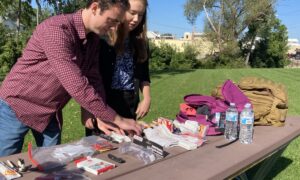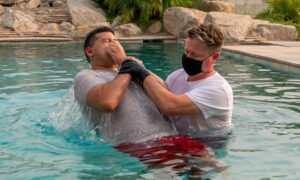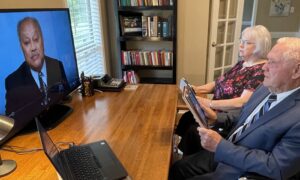 Some Jehovah’s Witnesses with leukemia turn to an atheist Cedars-Sinai doctor who respects their refusal to accept blood transfusions.
Some Jehovah’s Witnesses with leukemia turn to an atheist Cedars-Sinai doctor who respects their refusal to accept blood transfusions.Dr. Michael Lill examines Jehovah’s Witness leukemia patient Christina Blouvan-Cervantes, 27, while her husband, Andres Cervantes, 21, observes during a weekly checkup at Cedars-Sinai’s outpatient cancer center. (Genaro Molina / Los Angeles Times / January 10, 2012)
Christina Blouvan-Cervantes had been battling aggressive leukemia when her blood count plummeted and she landed in the emergency room in Fresno. Her doctors told her a blood transfusion was her only hope. But her faith wouldn’t allow her to receive one.
So she turned to one of the only doctors who could possibly keep her alive: a committed atheist who views her belief system as wholly irrational.
Dr. Michael Lill, head of the blood and marrow transplant program at Cedars-Sinai’s Samuel Oschin Comprehensive Cancer Institute, is a last recourse for Jehovah’s Witnesses with advanced leukemia.
PHOTOS: Doctor treats Jehovah’s Witnesses
They arrive at Lill’s door out of desperation and a desire to live. Many specialists decline to treat them because of their biblically centered refusal to accept blood transfusions, a mainstay of conventional care for the cancer.
Lill thinks their refusal is risky and illogical but nevertheless has devised a way to treat them that accommodates their religious convictions.
Despite his belief that God doesn’t exist, he has become a hero to many devout believers.
“We don’t care if he believes in God or not,” said David Goldfarb, chairman of the Los Angeles-area Hospital Liaison Committee for the Jehovah’s Witnesses. “What we really believe in is, ‘Are you a skilled and great doctor … and can you respect our belief system?'”
Lill, a 52-year-old Australian native, said ideological differences between doctor and patient are beside the point.
“Just because someone makes a decision which I would view as the wrong decision … doesn’t mean at that point in time I say, ‘No, I am not going to look after you anymore,’ ” he said. “I try and treat people’s religious beliefs with respect.”
Leukemia, a disease of the blood and bone marrow, produces cancerous blood cells. Treatment involves chemotherapy to destroy the cancerous cells, sometimes followed by transplants of stem cells that develop into healthy blood cells.
Blood transfusions are usually required, because both the cancer and the treatment suppresses the body’s production of blood cells. Without transfusions, the risk of death from anemia or bleeding is significantly higher.
Jehovah’s Witnesses draw their beliefs about blood from a literal interpretation of the Bible, which repeatedly warns against its consumption. Among the passages often cited by adherents: “You must not eat the blood; pour it out on the ground like water.”
It is a violation of God’s command for a Jehovah’s Witness to accept whole blood, red or white blood cells, platelets or plasma, Goldfarb said. It is left to patients to decide individually whether they are comfortable accepting stem cells.
Lill, who received his medical training in Australia, came to the United States in 1989 to work in the bone marrow transplant program at UCLA Medical Center. He accepted a position at Cedars-Sinai in 1997. He and his wife, a stem cell researcher, have two children.
He stumbled into the niche of treating Jehovah’s Witnesses with leukemia after getting his first referral about 15 years ago. He saw both a professional challenge and an unmet need. Since then, about 50 Witnesses from around the world have come to his team for help, including 35 who have received stem cell transplants.
“People have the right to make their own decisions,” he said. Before treating the patients, Lill has a candid discussion about religion and medicine, freely using words like “death” and “dying.”
About four years ago, Lill himself was treated for cancer of the appendix. The experience, he said, helped him better understand his patients’ fears.
To avoid transfusions, Lill first builds up patients’ blood counts with medications. Then he limits blood loss during a regimen of chemotherapy and stem cell transplants.
When he draws blood from patients to check their cell counts and organ function during treatment, he uses tiny pediatric tubes. He gives women a drug to suppress their periods and prescribes a hormone to boost red blood cells.
He has trained his staff in how to treat Jehovah’s Witnesses, and “No Blood” signs are posted in their hospital rooms.
Other hematologists and oncologists consider Lill’s bloodless treatment experimental and risky.
“There is a certain nobility in trying to help these patients,” said Dr. Stephen Forman, chairman of hematology and cell transplantation at City of Hope cancer center in Duarte. “But it is of questionable good safety…. You might get yourself in a situation where your patient could die.”
One of Lill’s Jehovah’s Witness leukemia patients died recently after suffering a brain hemorrhage. Lill said the death might have been prevented if the patient had received a transfusion.
During Lill’s rounds one recent morning at Cedars-Sinai, he washed his hands and went into the room of Kyle Hester, a 21-year-old Jehovah’s Witness from Fresno who was waiting for a stem cell transplant. Hester lay in his bed, hooked to an IV and an oxygen tube. His face was pale and his arms swollen. A book of Scripture lay open beside him.
Lill had bad news. Hester’s stem cell transplant would have to be postponed. His hemoglobin levels were too low, and he had pneumonia and a possible infection.
“I don’t know if we are going to have enough time to get everything about you perfect again before we move on to the next step,” Lill told him.
Hester bit his lip and nodded. His brother, Eric Hester, said they don’t believe in miracles. But they do believe in prayer. They pray for God to guide Lill.
–
http://www.latimes.com/health/la-me-jehovahs-20120202,0,509268,full.story





